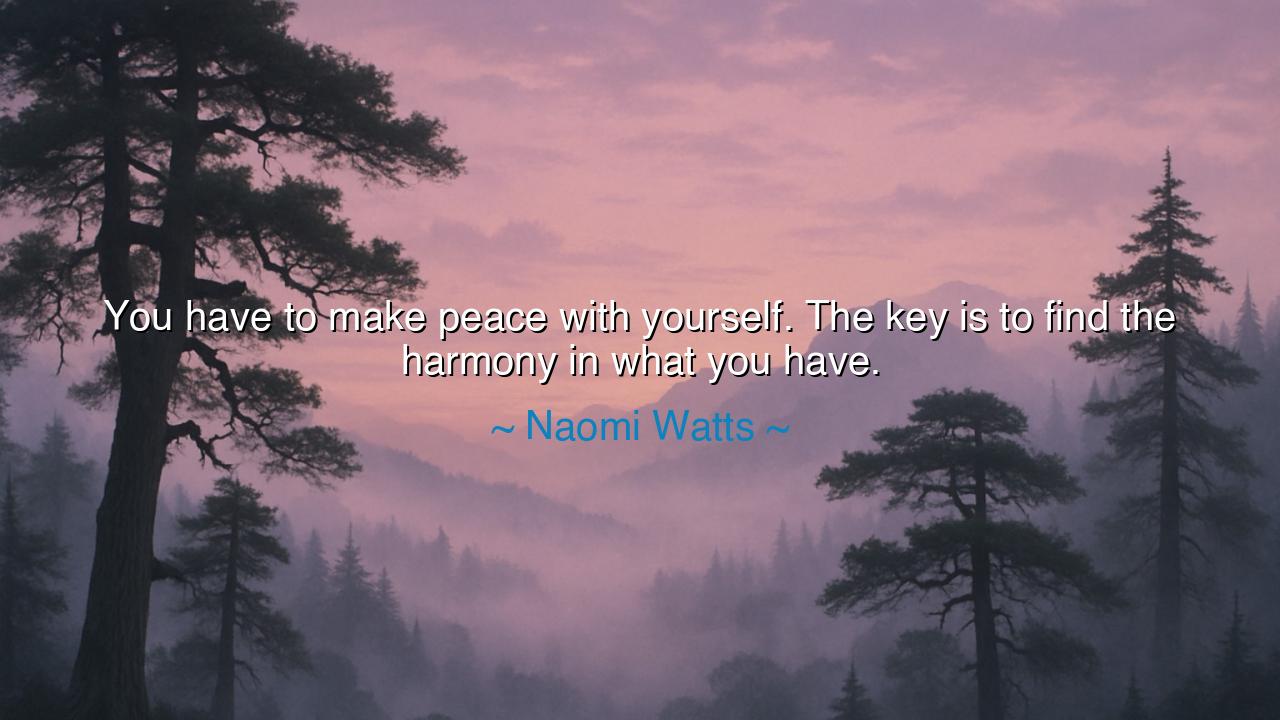
You have to make peace with yourself. The key is to find the






Hear the gentle yet powerful words of Naomi Watts: “You have to make peace with yourself. The key is to find the harmony in what you have.” Though spoken in modern times, these words echo the wisdom of the ancients, for the quest for peace within is as old as the human spirit itself. Watts reminds us that the battles we fight most fiercely are not with armies or with nations, but within the hidden chambers of our own hearts. Many seek joy in distant horizons, in treasures not yet won, in dreams not yet fulfilled—but she teaches us that the seed of contentment lies not in the “more,” but in the harmony of what already rests in our hands.
The origin of such wisdom is the eternal struggle of humanity against restlessness. From the earliest days, men and women have yearned for that which they do not possess, believing happiness to be found in the next harvest, the next conquest, the next possession. Yet sages, monks, and philosophers across the ages have declared the same truth: unless you make peace with yourself, no abundance will ever fill the void. Watts, an actress shaped by hardship and resilience, discovered this truth in her own life, teaching us that fulfillment is not born from perfection, but from acceptance.
Consider the story of Marcus Aurelius, emperor of Rome, who commanded legions and ruled over vast dominions. Despite all his power, he wrote in his Meditations that true peace does not come from controlling the world, but from controlling the mind. Surrounded by war, plague, and betrayal, Marcus taught himself to look inward, to seek harmony between what he desired and what he already possessed. His wisdom mirrors Watts’ declaration: that only by reconciling the self with reality can the spirit dwell in peace.
To make peace with yourself is not to abandon ambition, nor to cease striving for greatness. It is to cease the torment of endless dissatisfaction. It is to say: “Here is what I have, here is who I am, and I will find beauty even in imperfection.” For a house may be humble, yet filled with laughter; a body may be scarred, yet strong; a life may be ordinary, yet radiant with love. When the soul accepts this truth, harmony is born, and from harmony springs strength.
But beware, for the world entices with illusions. It whispers that peace lies in wealth, in status, in possessions. Those who listen are like wanderers chasing mirages across a desert, forever thirsty, never quenched. Watts reminds us to turn away from such illusions, to look instead at the cup already in our hand. Even if it is chipped, even if it is small, it can still hold the water that sustains life. To honor what we have is to disarm the restless hunger that robs us of joy.
The lesson is clear: seek not to control all things, but to harmonize with what is already yours. Begin by naming your blessings each day, however small. Forgive yourself for what you lack, and honor yourself for what you have endured. Tend the relationships you already possess, rather than coveting those beyond your reach. In these simple practices lies the key to harmony, and from harmony flows a strength no external wealth can match.
Therefore, O children of tomorrow, remember this teaching: the world may offer you endless distractions, but the true sanctuary lies within. Make peace with yourself, for without it, no crown, no treasure, no achievement will bring rest to your spirit. But with it, even the simplest life will shine with the beauty of completeness. Watts’ words are not merely counsel for the weary, but a map for all who seek the treasure of contentment: to find peace, look not outward, but inward, and to find joy, embrace the harmony in what you have.
–––






TVTrang Vu
Naomi Watts’ perspective on peace really challenges how we think about happiness. So many people spend their lives chasing things they believe will bring fulfillment, but this quote reminds us that maybe peace comes from within, through acceptance of what we have. But how do we cultivate that inner peace when it feels like we’re not where we want to be in life? Is contentment the key to true happiness?
HCDo Huu Chinh
I love how this quote encourages internal peace, but it’s not always easy to embrace what you have, especially when you're constantly striving for something greater. Can true harmony really come from accepting what you currently have, or does it sometimes require change and growth? How do we find a balance between accepting our circumstances and still pursuing personal growth or improvement?
TVvu thi van
This quote really speaks to me, especially in today’s world where there’s constant pressure to achieve more or be more. Finding peace with yourself and the life you have sounds simple, but can it really be done when society is always pushing for bigger and better things? How do we stop comparing ourselves to others and instead focus on our own growth and contentment?
AYAyashaki YuRin
Naomi Watts’ quote makes me reflect on the idea of self-acceptance. It’s so easy to get caught up in what we don’t have or what we think we’re missing, but finding peace with what we already have feels like a much more sustainable way to live. How do we learn to let go of the constant desire for more and truly appreciate what’s in front of us? Is there a way to practice this in our daily lives?